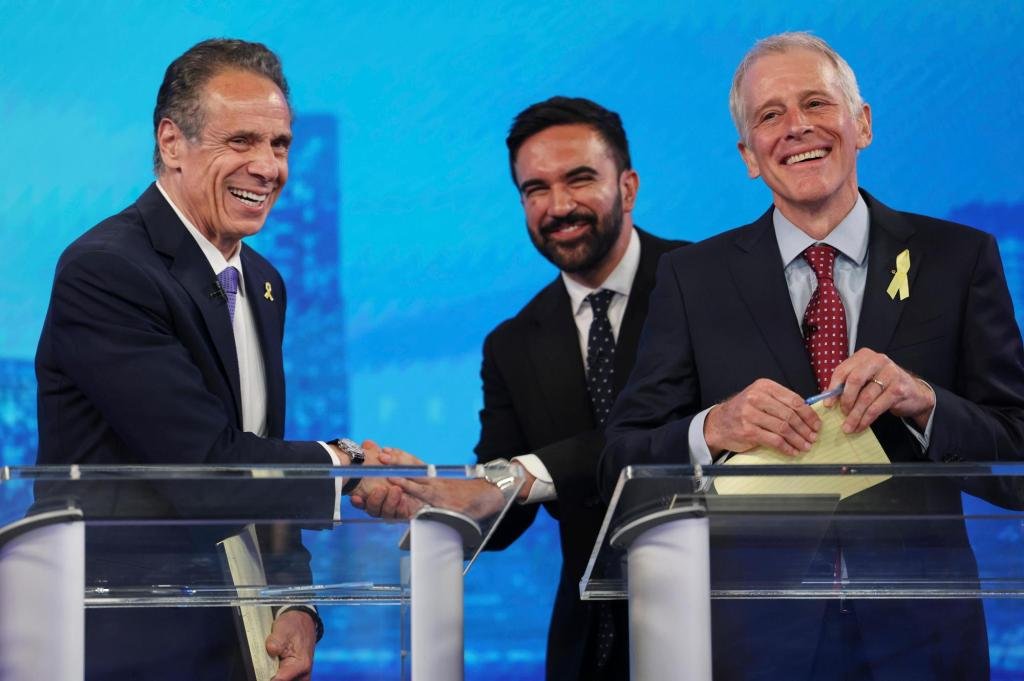New York City Democrats Face a Defining Moment in Mayoral Primary
On a sweltering June day, the streets of New York City buzzed with an urgency rarely seen in the political arena. Residents, many sporting campaign buttons and clutching pamphlets, flocked to polling stations to cast their votes for a mayoral primary that could redefine the city’s political landscape. With a veteran political operator emerging from scandal and a dynamic young progressive challenging the status quo, the stakes couldn’t be higher for Democrats navigating a fractured party just two years into a new administration.
The Candidates: A Tale of Two Visions
After four tumultuous years since Andrew Cuomo resigned as governor amid a sexual harassment scandal, the once-mighty politician sought to revive his political career, pitted against the progressive upstart Zohran Mamdani. While Cuomo, 67, brings a wealth of experience and connections to the table, Mamdani’s youthful zeal and leftist platform resonate with a growing demographic disillusioned with traditional politics.
Andrew Cuomo: A Resurrection Attempt
Cuomo’s tenure was marked by significant achievements, including major reforms in healthcare and education. “His experience is invaluable, especially in navigating the complexities of a city as diverse as New York,” says Dr. Evelyn Hartman, a political science professor at Columbia University. Yet, the shadow of his resignation looms large, casting doubt on whether New Yorkers are ready to accept him back as their leader.
- Deep experience in government.
- High recognition as a former governor.
- A strong fundraising network.
Zohran Mamdani: The Voice of a New Generation
In contrast, Mamdani’s campaign is a grassroots movement fueled by young voters eager for change. His platform, which includes free childcare, affordable housing, and advocating for marginalized communities, champions the progressive ideals that have increasingly dominated the Democratic narrative. Rebecca Choudhury, a political analyst, notes, “Mamdani represents a shift not just in policy but in the cultural identity of the party. Voters are looking for authenticity, and he embodies that.”
The Battle for the Democratic Soul
The stark divide between the candidates reflects a broader ideological struggle within the Democratic Party. While some establishment figures in the party, including Cuomo, criticize Mamdani as inexperienced, others see him as a beacon for the future. In recent polling, Mamdani has gained significant traction, even securing endorsements from prominent progressives like Rep. Alexandria Ocasio-Cortez and Sen. Bernie Sanders. “These endorsements signal a cohesive effort to energize the base and elevate progressive issues,” asserts Dr. Samuel Lee, an expert on urban politics.
Campaign Strategies: Tech vs. Tradition
Cuomo’s campaign is characterized by traditional methods: fundraising events filled with powerful allies and seasoned political operatives. Conversely, Mamdani’s approach leans heavily on digital media and community engagement. His social media prowess has enabled him to reach younger voters directly—a crucial demographic in this primary.
The Fallout from Scandals
The recent indictment of Mayor Eric Adams over corruption charges has added a new dimension to the race. The atmosphere is charged, as candidates attempt to draw distinctions not only between themselves but also from the embattled incumbent. Cuomo’s narrative has shifted; he now frames himself as a stabilizing force amid chaos. “This is a fight for the soul of Democratic politics in New York,” Cuomo declared at a recent debate.
Debate Highlights: Clash of Titans
The primary debates have revealed contrasting visions of leadership and governance. A particularly heated exchange resulted in Mamdani’s retort, “To Mr. Cuomo, I have never had to resign in disgrace.” Such moments encapsulate the tension between past and future, echoing the larger conflict within the party itself.
With New York City implementing ranked-choice voting, the question of electability looms large. “In ranked-choice scenarios, candidates need to appeal to a wider range of voters without alienating their base,” explains Dr. Hartman. The implications of this electoral system mean that simple numbers might not yield a clear winner immediately. Preliminary returns may only tell part of the story, complicating narratives as the city awaits the final tally.
What Lies Ahead
With both candidates targeting issues of systemic racism, economic inequality, and housing affordability, the mayoral race could serve as a microcosm of national Democratic conflicts, especially against the backdrop of a looming Trump presidency. As the polls draw to a close and the city holds its breath, New Yorkers are poised to make a decision that could reverberate through the political future of the nation.
The outcome of this primary could signify a pivotal moment for New York Democrats: Will they embrace a reformed Cuomo, or will they opt to support Mamdani’s vision of a progressive, inclusive city? Tomorrow’s results could not only reshape public policy but also set the stage for the Democratic Party’s direction leading into the next presidential elections.





